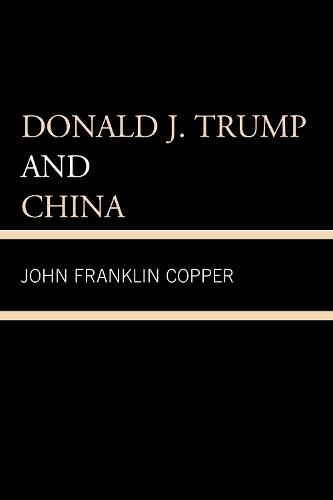Readings Newsletter
Become a Readings Member to make your shopping experience even easier.
Sign in or sign up for free!
You’re not far away from qualifying for FREE standard shipping within Australia
You’ve qualified for FREE standard shipping within Australia
The cart is loading…






In Donald J. Trump and China John F. Copper examines President Trump’s views of China that developed before and after he entered office. As a businessman and as a witness to US politics and foreign policy, Trump realized China was the most important country in the world to the United States. He also recognized that one of the key difficulties in American trade policy was the imbalance between the US and China. Copper argues that Trump blamed policy makers for the disparity and was determined to rectify the imbalance. President Trump undertook formulating a new China policy in spite of nonsupporters in the Democratic Party, the media, academia, and Hollywood. Donald Trump accepted China’s rise as an economic power and felt he could negotiate with President Xi to construct a positive relationship that would benefit both countries, save the global financial system, curb nuclear proliferation, and save the environment. Ultimately, Copper asserts that Trump knew a constructive relationship with China would be challenging, however he also understood that this is the nature of big power politics and strategic negotiations and realism would ensure peace between these two powerful countries.
$9.00 standard shipping within Australia
FREE standard shipping within Australia for orders over $100.00
Express & International shipping calculated at checkout
In Donald J. Trump and China John F. Copper examines President Trump’s views of China that developed before and after he entered office. As a businessman and as a witness to US politics and foreign policy, Trump realized China was the most important country in the world to the United States. He also recognized that one of the key difficulties in American trade policy was the imbalance between the US and China. Copper argues that Trump blamed policy makers for the disparity and was determined to rectify the imbalance. President Trump undertook formulating a new China policy in spite of nonsupporters in the Democratic Party, the media, academia, and Hollywood. Donald Trump accepted China’s rise as an economic power and felt he could negotiate with President Xi to construct a positive relationship that would benefit both countries, save the global financial system, curb nuclear proliferation, and save the environment. Ultimately, Copper asserts that Trump knew a constructive relationship with China would be challenging, however he also understood that this is the nature of big power politics and strategic negotiations and realism would ensure peace between these two powerful countries.